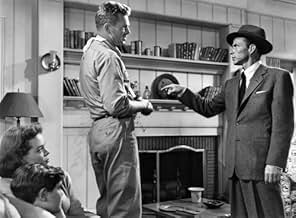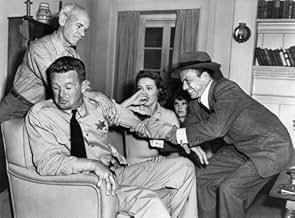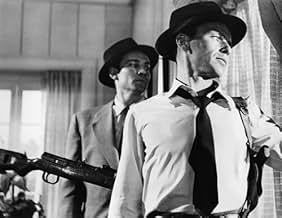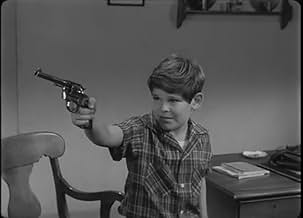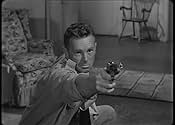En la ciudad de Suddenly, tres gánsteres atrapan a la familia Benson en su propia casa, en la cima de una colina cercana a la estación de ferrocarril, con la intención de asesinar al preside... Leer todoEn la ciudad de Suddenly, tres gánsteres atrapan a la familia Benson en su propia casa, en la cima de una colina cercana a la estación de ferrocarril, con la intención de asesinar al presidente de Estados Unidos.En la ciudad de Suddenly, tres gánsteres atrapan a la familia Benson en su propia casa, en la cima de una colina cercana a la estación de ferrocarril, con la intención de asesinar al presidente de Estados Unidos.
- Jud Hobson
- (as James Lilburn)
- Trooper
- (sin acreditar)
- Ed Hawkins
- (sin acreditar)
- Driver Asking Slim for Directions
- (sin acreditar)
- Schultz
- (sin acreditar)
- Driver Asking Tod for Directions
- (sin acreditar)
The movie came along during a low point of Sinatra's career before his 1954 Oscar reversed the slump. That's probably one reason he would take on such a risky role as the thoroughly dis-likable assassin. And visually, especially, Sinatra's's quite good. As a result, when Baron says he would be nothing without his gun, Sinatra's scrawny non-Hollywood appearance confirms the fact. Just as importantly, he gives the would-be assassin the right kind of nervous edge.
There's a fairly obvious theme working through the screenplay— namely that despite pacifist wishes, violence does have a moral place in life. As events in the movie turn out, the only way to stop Baron's immoral use of violence is with morally sanctioned counter-violence. The screenplay makes the point by showing us that had Pidge gone along with Mom's anti-gun wishes, the assassination plot would have succeeded. So fortunately-- the movie implies-- when push comes to shove, Pidge follows the men in his life and the plot fails.
For Cold War audiences of the day, the political lesson is pretty clear—only guns and muscle will stop Soviet plans to destroy "The American Way". Of course, the film never identifies the authors of the plot, but I'm sure audiences came to the obvious political conclusion. It's probably also telling that guns are identified with manly men and only a frightened woman, the mother, opposes them. Mom's doubts may be understandable given her husband's violent death. However, by ignoring Mom's wishes, no matter how understandable, Pidge comes to represent a future in which gun violence and armed national defense will continue to be morally necessary. Beneath the surface, it appears, lies some pretty heavy symbolism.
Subtexts aside, Suddenly remains a gripping film even this many years later. That's pretty darn good for a cheap production using basically one set for most of the action. But, I expect it's really the touchy subject matter that continues to excite viewers and separate the film from more routine suspensers of the day.
- dougdoepke
- 9 sept 2009
- Enlace permanente
Argumento
¿Sabías que...?
- CuriosidadesIn the first colorized version Frank Sinatra (Ol' Blue Eyes) was given brown eyes.
- PifiasWith the rifle locked in place, the chance of the President being exactly in line of fire is slim to none.
- Citas
John Baron: I'm not actor, bustin' my leg on a stage so I can yell 'down with the tyrants'. If Booth wasn't such a ham he might've made it.
- Versiones alternativasAlso available in a computer colorized version.
- ConexionesEdited into Your Afternoon Movie: Suddenly (2022)
Selecciones populares
- How long is Suddenly?Con tecnología de Alexa
Detalles
- Fecha de lanzamiento
- País de origen
- Idioma
- Títulos en diferentes países
- Repentinamente
- Localizaciones del rodaje
- Empresa productora
- Ver más compañías en los créditos en IMDbPro
Taquilla
- Recaudación en Estados Unidos y Canadá
- 1.400.000 US$
- Duración1 hora 17 minutos
- Color
- Relación de aspecto
- 1.75 : 1
Contribuir a esta página



















